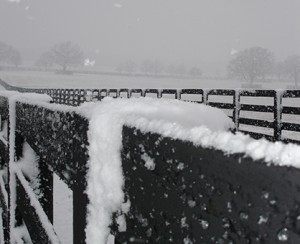Extended Cold Spell Poses Risks to Livestock
UK Ag News release by: Aimee Nielson
Save for the brief warm-up last weekend, this could end up being the coldest stretch of sub-freezing temperatures Kentuckians have experienced in quite some time. The lingering period of extreme cold puts livestock at risk.
“Normal temperatures this time of year are supposed to be in the low-to-mid 40s, with lows dipping into the 20s,” said Matthew Dixon, University of Kentucky agricultural meteorologist. “The low temperature for Lexington on Jan. 22 was -6 degrees Fahrenheit, and that’s the coldest this city has been since January 2004.”
As Arctic air builds in the state, livestock become vulnerable to deteriorating outside conditions. Dixon said that over the next week and possibly into early February, the livestock cold stress index will hover in the danger and emergency categories for much of Kentucky.
“We just want to remind livestock producers to take proper precautions,” said Jeff Lehmkuhler, livestock specialist for the UK College of Agriculture, Food and Environment. “We’ve already seen a case where a horse fell through the ice and had to be rescued earlier this month. There’s always a risk for that as animals search for water sources and end up walking out onto ice-covered ponds.”
Dixon said the system that brought unseasonably cold, Arctic air down into Kentucky will essentially stay in place through at least the next work week.
“The Bluegrass State will remain below freezing with multiple nights where the mercury will drop into the single digits,” he said. “Long-range outlooks are even calling for below-normal temperatures to continue into early February.”
For more information about livestock cold stress, read this article http://news.ca.uky.edu/article/bitter-cold-temps-will-create-prolonged-period-livestock-cold-stress.











